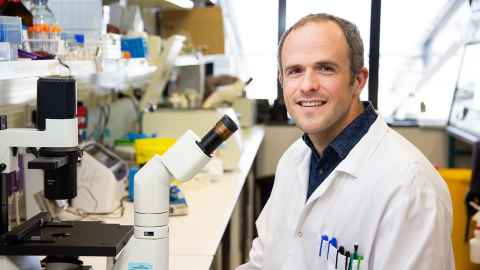A match made in the lab
9 March 2020
Conversation is the key to learning new things from one another. For some it starts as a casual chat about the weather for others it’s a shared connection and passion for cell communication.

Throughout his PhD, Dr Victor Dieriks focused on the effect of space radiation on human cells. He looked specifically at how cells communicate radiation damage to other cells that weren’t affected directly. Part of his PhD was prepping for a 12 day unmanned space mission called Foton M3. For those that have never heard of Foton M3, it was a 2007 Russian mission in low-earth orbit, during which a number of biological response studies were conducted. Monitoring cells in space was not Victor’s long-term career goal. It was his drive and desire to work on a project with a human aspect that led him to seek out Professor Maurice Curtis at the Centre for Brain Research.
When Victor first met Maurice, their expertise and skills were perfectly matched to create synergy and success in the lab, however there wasn’t currently a project on the go. Through funding from the Neuro Research Charitable Trust Maurice was able to set up a lab with the specific focus on understanding Parkinson’s Disease, with the ultimate goal of finding treatment to delay the onset of symptoms, allowing the person to live a functional and fulfilling life well into old age.
It is in this lab that Victor works to better understand Parkinson’s Disease and role the alpha synuclein has in the development and advancement of this debilitating disease at a cellular level.
“Although alpha synuclein is at the centre of Parkinson’s disease, we know very little about it. It is present throughout the body and plays a role at the intersection between neurons. The function in other cell types is still uncharted territory. In PD alpha synuclein clumps together into aggregates. This process seems to be toxic for cells,” explains Victor.
His daily job or tasks focus on monitoring cell reactions to understand how changes are read and communicated within the brain, specifically the speed of uptake or breakdown and the length of time the alpha synuclein stays in the cells.
Recent discoveries have made it clear that there won’t be a one-solution-fits-all to solving PD. We now know that alpha synuclein combines into larger structures. You can compare it to pieces of Lego that are stacked differently.
With each variant of alpha-synuclein protein the response to the cells is different resulting in symptoms and speed of onset that is different.
There are a number of labs around the world who are looking at this protein and believe that it holds answers we need to understand Parkinson’s disease. Dr Dieriks works closely with a team in Paris who are working on similar research. It is through this lab that he collaborates to create combinations of the alpha-synuclein protein and test responses.
“I was awarded the Ian and Sue Parton travelling fellowship in both 2018 and 2019. This fellowship allowed me to travel to Paris and spend time in the lab with my international colleagues, sharing ideas and insight into cell behaviour.”
Through this generous fellowship from Ian and Sue Parton, Victor has been able to network and collaborate with some amazing researchers. It also helped lay the foundations for a proposal to the Michael J Fox Foundation, which was successfully awarded in May last year.
The travelling fellowship will also allow him to have protein variants sent to New Zealand for testing here at the Centre for Brain Research, an unexpectedly difficult process for such a small traveller.
“These proteins are made in France, by my collaborators. They have developed a specialised formulation that allows the alpha synuclein variants to be stored indefinitely at -80°C. So when it send over the one gram of alpha synuclein to New Zealand by airplane it is transported in a 20kg box of dry ice that keep everything at the right temperature. Every step of the way it is checked that there is enough dry ice left and if not, it is topped up. You can almost say it is getting a first-class treatment.”
It is the generosity of philanthropists and other passionate Kiwis that allows researchers like Victor to seek out shared connections on a global level, starting a conversation that could lead to exciting and innovative discoveries in the lab.